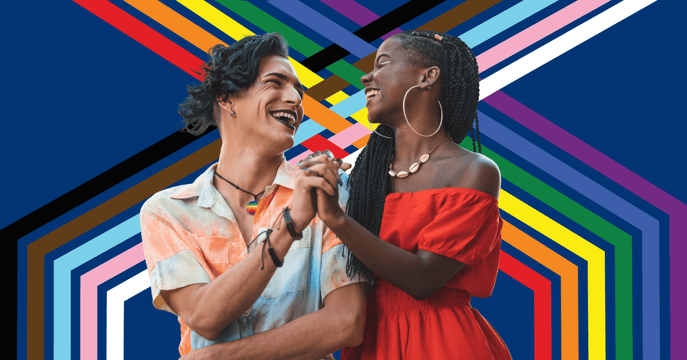DISQO & Do the WeRQ CX insights on LGBTQ+ ads and audiences

“The LGBTQ+ community’s cultural and economic influence is underestimated, and most marketers are failing at two things: continuing niche marketing strategies versus going mainstream, and compartmentalizing their stated allyship from the rest of their business practices,” said Kate Wolff, Do the WeRQ Co-Chair, Programming and Operations. “Our findings show it’s increasingly important to be fully authentic, from marketing to workplace to political engagements.”
Evolving recall and receptivity to LGBTQ+ content
People are experiencing an increase in the volume and diversity of LGBTQ+ content, but the authenticity and mainstream presence of content is not as advanced.
- Overall recall: Less than 7% did not recall seeing any LGBTQ+ advertising, compared to nearly 20% in 2021.
- Receptivity: This year, more people said they wanted more LGBTQ+ content (31% versus 21% last year). Also, there were fewer people who said they wanted less (22% this year versus 27% last). However, despite this progress, it remains a concern that more than one-fifth said there should be less inclusivity.
- DE&I: 26% said there should be roughly the same amount of LGBTQ+ content, but with more diversity in depictions. However, 27% recalled seeing LGBTQ+ people of color, and 20% recalled seeing transgender or non-binary people – both higher than the recall of ads with gay/queer men (20%) and lesbian/queer women (19%).
- Niche marketing: LGBTQ+ people were more likely to recall representation in content made for them (57%) versus mainstream content (33%).
- Authenticity: Overall, only 52% agreed that LGBTQ+ ads were authentic; 64% of LGBTQ+ people agreed with authenticity, while only 49% of non-LGBTQ+ felt the same.
“It’s our belief that there is a clear opportunity for brands to improve LGBTQ+ representation. Visibility drives progress, and brands can be powerful allies for visibility,” said David Azulay, Omnicom Client Lead and Global Co-Chair, OPEN Pride – Omnicom’s LGBTQ+ ERG. “While we were encouraged by the progress in how many people recalled seeing inclusive content this year, the persisting divide in receptivity based on demographic backgrounds as well as the increase in people saying that advertising was already sufficiently inclusive of LGBTQ+ people was disappointing.”
The role of brands in social activism
With some brands caught in controversy tied to proliferating anti-LGBTQ+ legislation, perceptions about brands and social activism were also examined. Overall, the report’s CX insights reveal that consumers recognize a brand’s power in advancing DE&I progress, and most make purchase decisions with consideration for where brands sit on issues.
- Do brands have influence? 72% believe brands have an influence on LGBTQ+ rights.
- Should brands be involved? 74% said companies should get involved in social issues such as DE&I, racial equality, gender equality, and social economics.
- Do consumers reward or punish brands for taking a stand? 85% consider a brand’s social and political activities when making purchases; less than 15% said that they “never” think about it. 54% said that they have not purchased a product or service because they disagreed with a brand’s position on an issue important to them.
- Have brands helped LGBTQ+? Nearly half said brands have been important in ushering LGBTQ+ progress (65% for LGBTQ+ identifying people).
The future influence of Millennials and Gen Z
Gen Zers already wield huge economic influence independently and through their families; they’ll reach an estimated 67 million in population and $33 trillion in spending by 2030. Demonstrating a brand purpose aligned with their values (as well as that of Millennials) is crucial.
- More connected to LGBTQ+: 67% of 18-24 year-olds said they have a family member or close friend who identifies as LGBTQ+.
- Want more inclusive content: 39% said they want more LGBTQ+ content; 70% believe it’s important content is made inclusively.
- Want brand allyship: 76% believe brands influence LGBTQ+ rights and 53% said brands should get involved in social issues.
- Will reward or punish brands: 72% said they think about brands’ social and political activities when making purchases; 58% have not bought from a brand because they disagree with their stance on an issue, and 50% went out of their way to buy a product because the brand supported an issue important to them.
“Next-gen consumers will settle for nothing less than brands that lead with purpose and holistic authenticity,” said David Grabert, Vice President of Brand and Communications at DISQO. “They’ll use their unrivaled access to information and their digital wallets to hold brands accountable. Our CX insights illuminate that brands must fully connect their brand purpose to holistic corporate DE&I initiatives, so every customer experience is aligned.”
The study with 9000+ consumers was conducted using DISQO’s CX platform between June 6 and 27, 2022. To download the CX insights and full report, visit here.
Marketing to LGBTQ+ audiences must be integrated and mainstreamed
85% of general population consider social and political impact when considering brands
39% of Millennials and GenZers want more LGBTQ+ content
About Do the WeRQ
Founded in 2020, Do the WeRQ is a community and platform with a clear and important mission: to increase LGBTQ+ creativity, representation, and share of voice in the marketing and advertising industry. Our members and volunteers work to deliver inspiration, mobilization, and celebration that drive sustainable, visible change. In pursuit of this mission, Do the WeRQ creates and leads a range of initiatives including research and data solutions, insightful programming and networking opportunities — including some of the industry’s most talented and proudly out thought leaders. Follow @DotheWeRQ on Twitter and Instagram.
